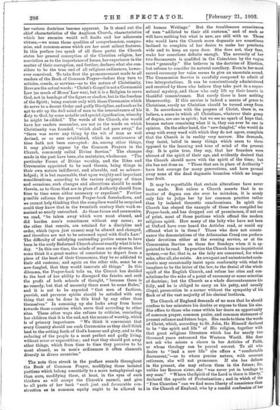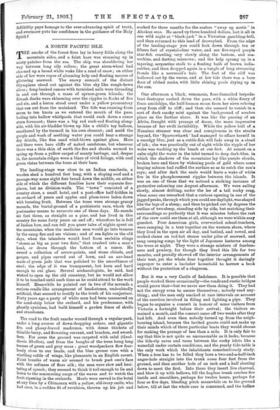THE PREFACE TO THE PRAYER-BOOK.
T"preface to the Prayer-book, though so well known and so much debated by ecclesiastical experts and students of Church law and history, is very little read by the general public, partly owing, no doubt, to an unfortunate custom of printing it in extremely small type. Yet he who would grasp the spirit of the Reformed Church of England must make himself familiar with this intro- duction. Through its medium the relative values of
her various doctrines become apparent. In it stand out the chief characteristics of the Anglican Church, characteristics which her enemies would call faults and her adherents virtues,—we mean those qualities of comprehension, compro- mise, and common-sense which are her most salient features.
In this preface (we speak of all three parts) the Church states her general conception of the Christian religion, her conviction as to the importance of forms, her experience in the matter of their corruption, and further, declares what she con- siders to be the true end of all religious ordinances, howso- ever conceived. To take first the pronouncement made to all readers of the Book of Common Prayer—before they turn to articles, creeds, or services—as to the nature of Christianity. Here are the actual words : "Christ's Gospel is not a Ceremonial Law (as much of Moses' Law was), but it is a Religion to serve God, not in bondage of the figure or shadow, but in the freedom of the Spirit; being content only with those Ceremonies which do serve to a decent Order and godly Discipline, and such as be apt to stir up the dull mind of man to the remembrance of his duty to God, by some notable and special signification, whereby he might be edified." The words of the Church, she would have her readers remember, are not as the words on which Christianity was founded, "which shall not pass away," for "there was never any thing by the wit of man so well devised, or so sure established, which in continuance 'of time bath not been corrupted : As, among other things, it may plainly appear by the Common Prayers in the Church, commonly called Divine Service." The changes made in the past have been, she maintains, wholesome. "The particular Forms of Divine worship, and the Rites and Ceremonies appointed to be used therein, being things in their own nature indifferent, and alterable, and so acknow- ledged; it is but reasonable, that upon weighty and important considerations, according to the various exigency of times and occasions, such changes and alterations should be made therein, as to those that are in place of Authority should from time to time seem either necessary or expedient." Further possible reforms the present Prayer-book foreshadows, and we cannot help thinking that the compilers would be surprised could they know that in the twentieth century their work re- mained so nearly untouched. As those forms and ceremonies, we read, "be taken away which were most abused, and did burden men's consciences without any cause; so the other that remain, are retained for a discipline and order, which (upon just causes) may be altered and changed, and therefore are not to be esteemed equal with God's Law." The difficulty of satisfying contending parties seems to have been in the early Reformed Church almost exactly what it is to- day. "In this our time, the minds of men are so diverse, that some think it a great matter of conscience to depart from a piece of the least of their Ceremonies, they be so addicted to their old customs; and again on the other side, some be so new-fangled, that they would innovate all things." In this dilemma, the Prayer-book tells us, the Church has decided to the best of her ability to disregard the fancies and seek the profit of both schools of thought, " because there is no remedy, but that of necessity there must be some Rules," and it is not to be expected " that men of factious, peevish, and perverse spirits should be satisfied with any thing that can be done in this kind by any other than themselves." In summing up she looks away from home towards those countries which serve God according to other rites. These other ways she refuses to criticise, reminding her children that it is the end, not the means of worship, which is of primary importance. " We think it convenient that every Country should use such Ceremonies as they shall think beat to the setting forth of God's honour and glory, and to the reducing of the people to a moat perfect and godly living, without error or superstition ; and that they should put away other things, which from time to time they perceive to be most abused, as in men's ordinances it often chanceth diversly in divers countries."
The note thus struck in the preface sounds throughout the Book of Common Prayer, modifying those isolated portions which belong essentially to a more metaphysical age than ours, modifying them, at least, in the eyes of such thinkers as will accept the Church's council, and give to all parts of her book "such just and favourable con- struction as in common equity ought to be allowed to _ all human Writings." But the troublesome consciences of men "addicted to their old customs," and of such as
will have nothing but what is new, are still with us. Those who would have the Church more dogmatic are sometimes inclined to complain of her desire to make her precincts wide and to keep an open door. She does not, they fear, make her assertions definite enough. The necessity of her two Sacraments is qualified in the Catechism by the vague word " generally." She believes in the doctrine of Election, but refuses to consider its natural corollary. Even in her most sacred ceremony her voice seems to give an uncertain sound. The Communion Service is carefully composed to admit of two interpretations. It can be conscientiously administered and received by those who believe they take part in a super- natural mystery, and those who only lift up their hearts in thankful remembrance. But surely there is here nothing blameworthy. If this service is indeed a means of grace to Christians, surely no Christian should be turned away from it. In accordance with the prayers of Christ, there is, we believe, a sense in which all Christians, whatever their grasp of dogma, are one in spirit; but we see no spark of hope that, human nature remaining what it is, they can ever be one in opinion. On the other hand, the " new-fangled," who would do away with every word with which they do not agree, complain that the Church is in reality very narrow. She demands, they insist, belief in many things which seem to them opposed to the learning and tone of mind of the present day. It is quite true, they say, that her founders were abreast of the spirit of their age, and evidently desired that the Church should move with the spirit of the time; but she has not done so. " Those that are in place of Authority" have lost courage for many generations, and have pruned away none of the dead dogmatic branches which no longer bear fruit.
It may be regrettable that certain alterations have never been made. But unless a Church asserts that in no
matter of dogma can she ever be mistaken, it is surely only fair to judge her by her common practice rather than by isolated theoretic anachronisms. In spirit the Church has obeyed the example of those who compiled her Prayer-book, and has dropped out of prominence, if not out of print, most of those portions which offend the modern religious spirit. How many of the laity who have not been at Oxford have ever heard the Articles read, or could say offhand what is in them ? Those who dare not counte- nance the denunciations of the Athanasian Creed can perform their devotions either at the evening service, or at the Communion Service on those few Sundays when it is ap- pointed to be read. In practice the Church has no inquisitorial system,—so far, that is, as the laity are concerned, for whose sake, after all, she exists. An arrogant and uninstructed eccle- siastic may occasionally insist upon conformity with what he imagines to be the letter of the law, to the denial of the whole spirit of the English Church, and refuse her rites and con- solations for the sake of a point of ceremony or some minutiae of doctrine; but the Church as a whole discountenances his folly, and he is obliged to carry on his petty, and usually illegal, persecution in a corner without the sympathy of his flock or of the vast majority of his clerical brethren.
The Church of England demands of no man that he should confess to her ministers his doubts or expose to them his sins. She offers to those who come within her doors an opportunity of common prayer, common praise, and common statement of present reliance and future hope. She reads to them the words of Christ, which, according to St. John, He Himself declared to be "the spirit and life" of His religion, together with that great religious literature which has for nearly two thousand years entranced the Western World. She does not ask who misses a clause in her Articles of Faith, or whose theology can be proved correct. To all who desire to " lead a new life" she offers a " comfortable Sacrament,"—as to whose precise nature, with reverent reticence, she will not pronounce. If she has defects in the present, she may reform them in the future; for, unlike her Roman sister, she " was never yet in bondage to any man." " Where the Spirit of the Lord is there is liberty," declared the apostle of Protestantism ; and in which of the " Free Churches " can we find more liberty of conscience than in the Church of England, who by a candid confession of her
fallibility pays homage to the ever-advancing spirit of truth, and evermore puts her confidence in the guidance of the Holy Spirit ?












































 Previous page
Previous page